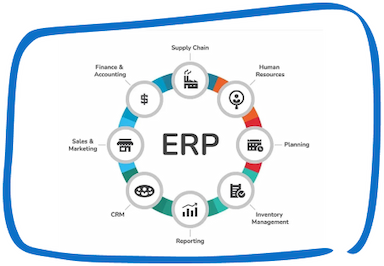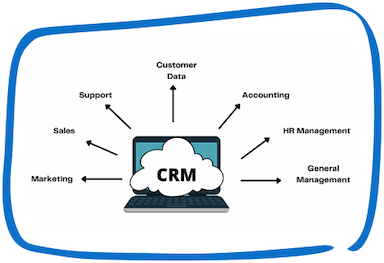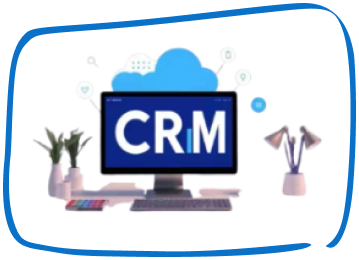ERP Sales Modules:
The ERP sales modules represent a pivotal component within any business as they facilitate the management of all export and domestic sales activities. These modules effectively store and maintain databases related to customers and products. However, they encompass various stages such as sales and marketing, order placement, dispatching, handling inquiries, and managing order schedules.
Why Opt for ERP in Sales?
Sales constitute the core of any business, whether dealing with products or services. Although the approaches may vary across different businesses, the ultimate objective remains consistent: attract more customers to purchase offered goods or services. In this context, ERP software can support the implementation and adherence to widely acknowledged best sales practices. This involves proficiently tracking all interactions with customers and seamlessly integrating with complementary modules like CRM, Accounting, and Inventory.
Revolutionize Your Business with Our ERP Solution
Streamline your operations and enhance productivity with our all-in-one ERP solution. Manage finance, HR, inventory, and more from a single platform.
Analyzing the Workflow
Similar to prior modules, let’s explore essential components within an ERP’s Selling module:
Customer:
A customer, also known as a client, buyer, or purchaser, refers to an individual or organization receiving goods or services from a seller, typically through a financial transaction. An ERP software stores any entity engaging in such transactions with your business within the customer database.
Quotation:
A quotation is a document detailing estimated pricing quotes and other engagement terms (e.g., taxes, T&C) related to the buyer’s intended purchase. These quotations typically remain valid for a specific duration, subject to the discretion of the business. They are also referred to as proposals, estimates, or proforma invoices.
Sales Order:
A sales order serves as confirmation of a quotation, indicating mutual agreement between both parties regarding a financial transaction. Before finalizing and submitting a sales order, you should resolve any discrepancies from the quotation (such as price changes).
Blanket Order:
A blanket order represents a customer’s request to procure materials for specific items within a defined timeframe at a pre-negotiated rate. It allows the generation of sales orders based on an agreed-upon delivery schedule.
Sales Partners:
Sales partners encompass any entity, be it an individual or a company, that aids in procuring business for you. Other titles may refer to them as channel partners, distributors, dealers, agents, retailers, or resellers. The ERP software typically defines a specific commission rate for sales partners, which they operate with. When a sales partner is selected during transactions, the software automatically calculates their commission based on the net total of the transaction.
Sales Reports:
You can assess your company’s sales performance by utilizing sales reports, enabling the analysis of sales data from various perspectives.
Sales Analytics Report:
This report enables the analysis of sales orders and invoices, facilitating comparisons of value or quantity across different periods. Specific parameters, such as customers, customer groups, items, item groups, territories, or order types, enable making this comparison.
Sales Order Analysis Report:
This report furnishes the current billing and delivery status for all active sales orders, providing valuable insights into ongoing sales order progress and fulfillment.
Establishing a Sales Workflow
Following their trials and evaluations, the sales team initiates the use of the subsequent sales workflow:
Customer Database Setup:
Sales personnel input all existing customers’ information into the system, creating a comprehensive database containing details for each customer. This includes data such as tax IDs, account managers, accounting specifics, and territorial details, among others.
Sales Partner Integration:
The system uploads a roster of sales partners along with their commission particulars. This process eliminates the need for manual data entry concerning these sales partners in future transactions.
Quotation Generation from CRM Opportunities:
When an opportunity arises within the CRM module, a quotation is dispatched to the customer. This quotation encompasses all pertinent transaction details, comprising quantities, pricing, tax specifications, discounts, fulfillment dates, and more.
Conversion to Sales Order:
Upon customer approval of the quotation, it is transformed into a sales order. This serves as confirmation from the buyer, indicating their readiness to purchase clothing items.
Handling Blanket Orders:
Users enter and store specific expectations within the system when placing blanket orders.. This encompasses details regarding validity periods, item quantities, prices, and any additional terms and conditions. The system generates sales orders from the blanket order, following the agreed-upon delivery cycle.
Key Benefits of ERP Sales Modules
Streamlined Database Management:
The sales modules streamline customer data, offering a comprehensive view that integrates sales, marketing, and customer service information in an organized structure. Additionally, these modules provide real-time data, empowering accurate decision-making.
Accurate Sales Forecasting:
Efficient data recording within the modules, considering crucial factors, facilitates precise sales forecasts. Real-time data plays a pivotal role in enabling the sales department to generate accurate projections.
Structured Sales Process:
The modules facilitate a structured framework for the sales team, presenting all necessary information in a unified interface. This aids sales personnel in tracking, monitoring, and managing various stages of the sales function based on their status.
Performance Enhancement:
ERP sales modules enable data updates, work scheduling, and streamlined notifications for the sales process. Consequently, sales representatives can dedicate more focus to driving sales while significantly enhancing overall business performance.
Improved Internal Collaboration:
These modules foster seamless collaboration among sales teams by collecting and presenting work-related data in an accessible format. They facilitate easy data retrieval, reducing the need for unnecessary meetings and collaboration, thus promoting enhanced internal cooperation among team members.
Get a Tailored ERP Solution for Your Business
Unlock the power of a customized ERP solution designed to meet the unique needs of your business. Let us help you drive efficiency and growth.
The bottom line
We’ve delved into the fundamental features of the ERP system’s sales module and observed how they contribute to the enhancement of businesses. Initially, the implementation and procurement of ERP software might seem like an exciting endeavor. However, selecting the appropriate ERP system tailored to your business needs lays a robust foundation, facilitating sustained growth over time. The optimal ERP sales modules for your company not only fulfill current requirements but also assist in addressing significant challenges while leveraging opportunities for progressive business expansion.
Speak with Our Team!
4.9 Stars
1k+ reviews on






